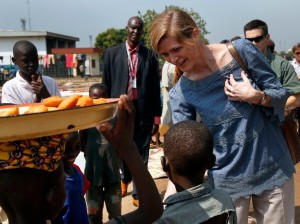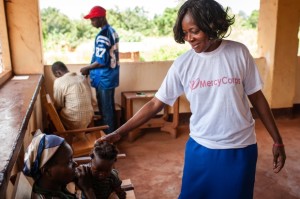
Continued sectarian violence in the Central African Republic (CAR) has led some to believe that the once “pre-genocidal” nation has devolved into a state that can only be described as “genocide.” The “level-three” crisis has put approximately 1.3 million at risk of starvation, and an estimated 2.5 million in need of some form of humanitarian assistance in a country with a population of only 5.2 million.
 Last week, U.S. policymakers focused their attention on U.S. humanitarian efforts to prevent conflict and instability in response to the escalation of ethnic conflict in CAR.
Last week, U.S. policymakers focused their attention on U.S. humanitarian efforts to prevent conflict and instability in response to the escalation of ethnic conflict in CAR.
The House Foreign Affairs Subcommittee on Africa, Global Health, Global Human Rights, and International Organizations Chairman Chris Smith (R-NJ) expressed optimism with U.S. investments in humanitarian efforts and a UN peacekeeping force, but pushed for more to be done to defuse the conflict, noting that “the window for action is narrowing each and every day.”
The escalation of the conflict has spurred a greater response from both the U.S. government and the NGO community. On April 9, a delegation – including Ambassador Samantha Power, Assistant Secretary of State for African Affairs Linda Thomas-Greenfield, and Subcommittee Ranking Member Karen Bass (D-CA) – visited CAR to meet with the Transitional President, commanders of the African Union and French peacekeeping forces, and members of civil society to discuss ways to cooperate on protecting civilians from further violence by reestablishing governance and security.
Additionally, the State Department has appointed Ambassador Stuart Symington as the Special Representative for the CAR, in order to restore U.S. diplomatic presence.
The NGO community has also been active in CAR, supported by the U.S. Government. The U.S. has provided $67 million in humanitarian assistance to date, with $7.5 million going to NGOs in the field like Catholic Relief Services and Mercy Corps. These two organizations currently oversee various programs to provide immediate assistance to those fleeing violence – providing safe food and water, strengthening vulnerable communities to keep them from being susceptible to further violence, and creating opportunities to build sustainable economies.
 Development professionals continue to take on enormous risk by helping those in need in CAR, as we saw a week ago when three Medecins sans Frontieres doctors were killed in Northwest CAR while trying to provide basic health care services.
Development professionals continue to take on enormous risk by helping those in need in CAR, as we saw a week ago when three Medecins sans Frontieres doctors were killed in Northwest CAR while trying to provide basic health care services.
The U.S. has also worked with international partners at the United Nations, which included support for a UN Security Council Resolution authorizing a peacekeeping operation (MINUSCA) of up to 10,000 military personnel, 1,800 police personnel, and 20 corrections officers. The U.S. has also had a role in improving the security response to the crisis by providing funds, resources, and training for the African Union peacekeeping mission (MISCA), which will make for a smoother transition to MINUSCA in September. Following his trip to Africa last week, Secretary Kerry noted, “The United States and African nations have deep historic and economic ties,” and preventing conflict is in our best interest. U.S. development and diplomacy programs supported by the International Affairs Budget are working to defuse the conflict in CAR by providing humanitarian assistance to refugees and working to find sustainable solutions to establish stability.
Even with numerous global conflicts on America’s plate right now, our coordinated response to CAR shows that the U.S. role as a global leader is vital for helping those seriously in need.